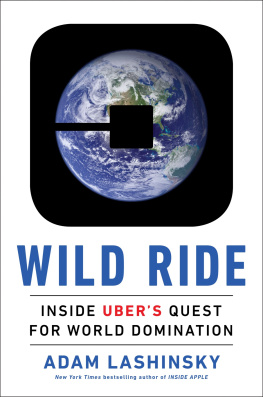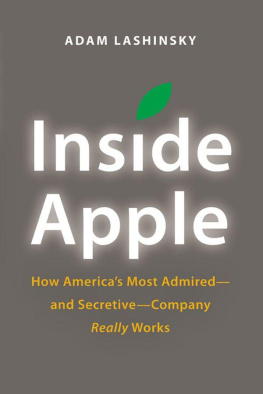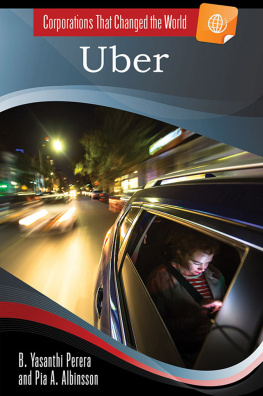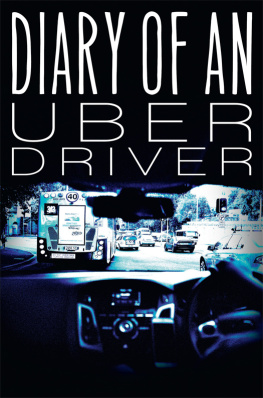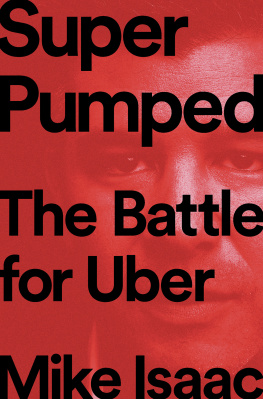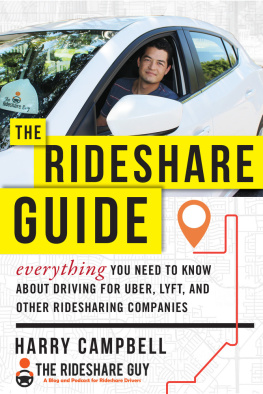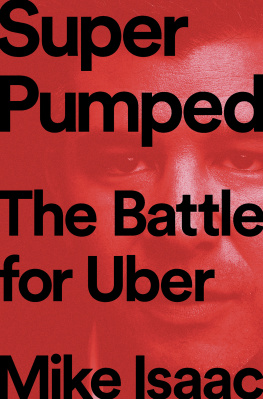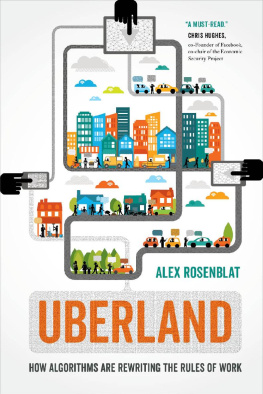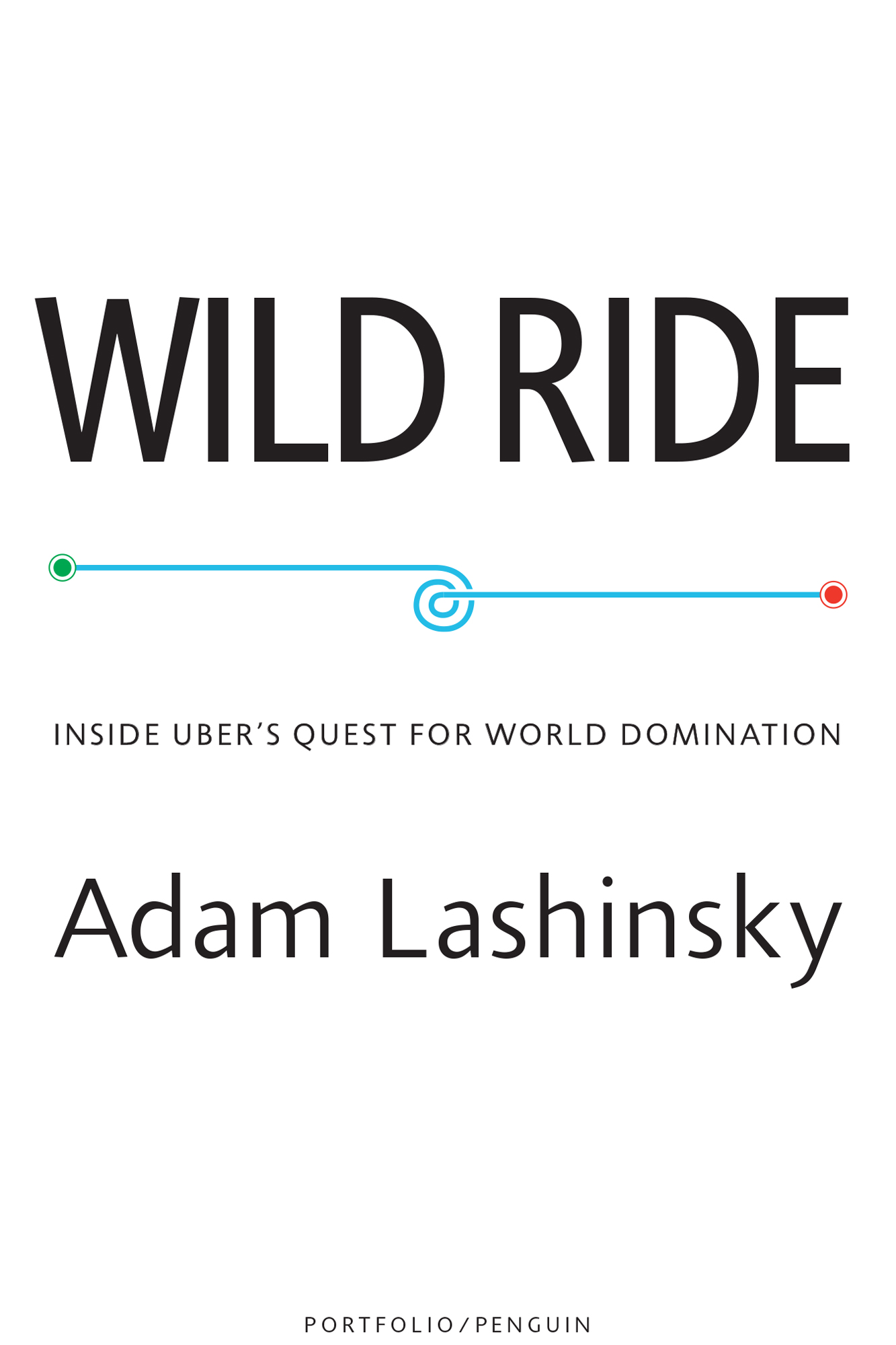
Portfolio/Penguin
An imprint of Penguin Random House LLC
375 Hudson Street
New York, New York 10014
penguin.com
Copyright 2017 by Adam Lashinsky
Penguin supports copyright. Copyright fuels creativity, encourages diverse voices, promotes free speech, and creates a vibrant culture. Thank you for buying an authorized edition of this book and for complying with copyright laws by not reproducing, scanning, or distributing any part of it in any form without permission. You are supporting writers and allowing Penguin to continue to publish books for every reader.
PHOTOGRAPH CREDITS
: Courtesy of Uber
: Kevin Smilak
: Courtesy of Francesco Fabbrocino
: Shervin Pishevar
: Frederique Dame
: Copyrighted 2017, Mashable, Inc. 127877:0317 AT
: World Economic Forum
: Angelo Meredino / AFP / Getty Images
Most Portfolio books are available at a discount when purchased in quantity for sales promotions or corporate use. Special editions, which include personalized covers, excerpts, and corporate imprints, can be created when purchased in large quantities. For more information, please call (212) 572-2232 or e-mail specialmarkets@penguinrandomhouse.com. Your local bookstore can also assist with discounted bulk purchases using the Penguin Random House corporate Business-to-Business program. For assistance in locating a participating retailer, e-mail B2B@penguinrandomhouse.com.
LIBRARY OF CONGRESS CATALOGING-IN-PUBLICATION DATA
Names: Lashinsky, Adam, author.
Title: Wild ride : inside Ubers quest for world domination / Adam Lashinsky.
Description: New York : Portfolio, 2017.
Identifiers: LCCN 2017006832 (print) | LCCN 2017013375 (ebook) | ISBN 9780735211407 (ebook) | ISBN 9780735211391 (hardback)
Subjects: LCSH: Uber (Firm) | Ridesharing. | BISAC: BUSINESS & ECONOMICS / Corporate & Business History. | BUSINESS & ECONOMICS / Industries / Transportation. | BUSINESS & ECONOMICS / Industries / Computer Industry.
Classification: LCC HE5620.R53 (ebook) | LCC HE5620.R53 L37 2017 (print) | DDC 388.4/13214dc23
LC record available at https://lccn.loc.gov/2017006832
Version_1
For my family:
Ruth, Leah, Amy, Paula, Robert, Bernard,
and Marcia, whose memory I cherish.
Contents
CHAPTER 1
A Wild Ride Through China
T ravis Kalanick sits in the back of a chauffeur-driven black Mercedes making its way through the traffic-clogged streets of Beijing. It is the dead of summer in 2016, and the sky above the Chinese capital is thick with pollution, the air muggy and still. As CEO of Uber, the worlds most valuable start-up, Kalanick has been visiting China about every three months for three years now. All the travel from his home base in San Francisco is part of a money-draining and quixotic gambit to replicate the global success of Ubers disruptive ride-hailing service in the worlds most populous country.
Kalanick has spent the previous three days in Tianjin, a megacity on the Yellow Sea, two hours southeast of Beijing. There he was a cochair of the World Economic Forums (WEF) New Champions meeting, the so-called summer Davos. Weeks shy of his fortieth birthday, Kalanick was the toast of Tianjin, where he enjoyed the considerable fringe benefits of his newfound worldwide prominence. The California start-up he runs has been around a mere six years, yet at the off-season international gabfest he scored an audience with the second most powerful government official in China, Premier Li Keqiang. Kalanick appeared on WEF panels moderated by Western and Chinese broadcasters, gamely attempted to flip a traditional pancake over an intimate dinner with the managers responsible for Ubers local operations in Tianjin, and huddled with his entrepreneurial peers. Among them was Lei Jun, founder of the highly valued Chinese smartphone maker Xiaomi. Leis penchant for bold claims and his companys controversial business model of selling ultracheap phones make him as notorious in China as Kalanick is everywhere else.
Already, Kalanicks trip is a success, judged at least through the prism of the image-enhancing mentions he has racked up in the Chinese and international press. Li, the Chinese premier and an outspoken promoter of entrepreneurialism in China, called Kalanick a pioneer. He said this in English, a flattering flourish and tidbit the Uber CEOs China-based minions dutifully fed to the local press. Indeed, Kalanicks every utterance on this trip is making headlines. Asked during a WEF fireside chat if self-driving vehicles would make the human-driven kind obsolete, Kalanick threw off one of his signature and controversial one-liners that combined insouciance, boastfulness, and dont-mess-with-me humor. You might own a car like maybe some people own a horse, he deadpanned in front of an admiring audience. You know, you might take a ride on the weekends or something.
As he leaves Tianjin and in the privacy of his human-driven vehicle on the road to Beijing, however, his cocky good cheer gives way to prickly tension. In fact, Kalanick has a full-blown crisis on his hands. He joins a conference call with a team of Uber executives in three countries on two continents. A team of communications executives dials in from San Francisco. Others call from Seoul, South Korea. Two executives are in the car with Kalanick, both critical to Ubers Asian ambitions. One is Emil Michael, Ubers chief business officer and the CEOs all-purpose right-hand man, to whom on this very trip Kalanick has delegated the role of engaging in high-stakes and secretive negotiations to sell Ubers China business to its chief rival, Didi Chuxing. The other is Liu Zhen, the head of strategy for Uber China and its best-known Chinese employee. Liu is also a first cousin of Jean Liu, the former Goldman Sachs banker who is president of Didi and whose father founded the computer behemoth Lenovo.
The purpose of the call is to discuss whether or not Kalanick should travel as planned early the next day to Seoul for a most unusual appointment. In late 2014 a Korean prosecutor indicted Kalanick, holding him responsible for what the South Korean government deemed to be Ubers illegal taxi service. This service was a version of the companys popular UberX service in the United States, in which amateur drivers use their own cars to serve passengers. Kalanick agreed to appear in court to answer the charges. The plan, worked out by Ubers legal team after protracted negotiations with the Korean prosecutors, is for Kalanick to plead guilty to what is effectively a misdemeanorand then to be immediately released.
From a legal perspective, appearing in the Seoul court is low risk. Prosecutors have assured Ubers lawyers that Kalanick would be given a suspended sentence, making him free to leave Seoul. And that would be fine with the CEO, who is well accustomed at this point to picking fights with regulators and other officials the world over. Since it received its first cease-and-desist letter from the city of San Francisco in 2010, Uber has been clashing with adversaries from Seattle to New York and Paris to Delhi and beyondoften with its pugnacious CEO stirring the pot with inflammatory comments to the media and outrageous tweets. Whats more, South Korea wasnt all that important a market for Uber, with restrictive laws preventing the company from operating all but the highest-end limousine version of its service there. Ubers motivation in settling the case, therefore, wasnt so much about commerce as about eliminating a pesky and embarrassing thorn in its CEOs side.

